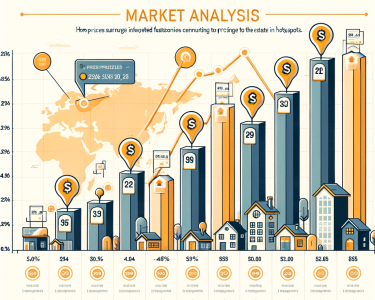As economies recover from the aftermath of the global recession, the real estate market is experiencing a remarkable upswing. With growing investor confidence and increasing demand for housing, property values are soaring, and the sector is witnessing a robust resurgence. This article delves into the factors contributing to the current real estate boom and explores the implications for both buyers and sellers.
- A Post-Recession Rebound: The economic recovery following the recession has laid a solid foundation for the resurgence of the real estate market. As job creation and consumer spending regain momentum, individuals and families are once again considering homeownership as a viable investment option. Low mortgage rates and favorable lending conditions have further fueled this upward trend, making it an opportune time for prospective buyers to enter the market.
- Shifts in Lifestyle and Work Patterns: The COVID-19 pandemic brought about substantial shifts in lifestyle and work patterns, leading to a surge in remote work and a reevaluation of living arrangements. With the realization that working from home could become a long-term arrangement for many, individuals are now prioritizing larger living spaces, home offices, and proximity to outdoor amenities. This change in preferences has prompted a significant demand for suburban properties and locations offering a better work-life balance.
- Urban Renaissance: Contrary to initial predictions of urban decline, cities are experiencing a renaissance in real estate demand. As the pandemic recedes, people are returning to urban centers, drawn by the cultural vibrancy, employment opportunities, and the convenience of amenities within reach. Consequently, urban property markets are witnessing a surge in demand, resulting in increased property values and renewed interest in commercial real estate ventures.
- Investor Confidence: The real estate market’s revival has also attracted the attention of investors seeking to diversify their portfolios. With low interest rates and alternative investment options offering limited returns, real estate has emerged as an attractive asset class. Institutional investors, private equity firms, and even individual investors are pouring capital into residential and commercial properties, driving up prices and intensifying competition in major markets.
- Potential Challenges: While the booming real estate market offers numerous benefits, it is not without challenges. Rapid price appreciation may lead to concerns about affordability, potentially excluding some potential homebuyers from the market. Additionally, an imbalance between supply and demand could contribute to the creation of housing bubbles, necessitating careful monitoring and proactive measures from regulators.
Conclusion: The real estate market is experiencing a remarkable resurgence, fueled by a combination of post-recession recovery, shifting lifestyle preferences, and investor confidence. Prospective buyers must navigate a dynamic landscape where property values are rapidly appreciating. Likewise, sellers can capitalize on the heightened demand but must remain mindful of potential challenges. As the market continues to evolve, it is imperative for all stakeholders to maintain a cautious yet optimistic outlook and adapt to the changing dynamics of this thriving sector.
Disclaimer: The views and opinions expressed in this article are those of the author and do not necessarily reflect the official policy or position of any agency or organization.




